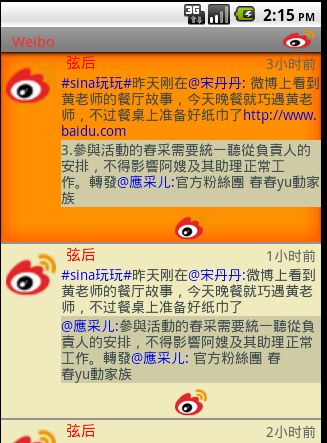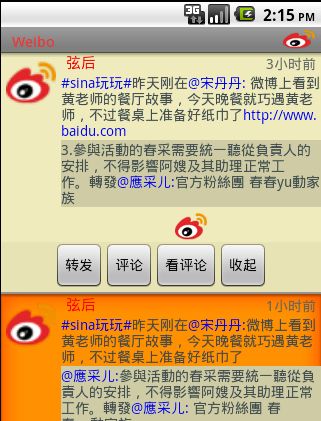实现ListView的条目下自动隐藏显示Button的方法
这个想法是我在看了sina微博的塞班客户端的微博显示效果而想移植到Android平台上,因为它的体验很好,而我们做的效果就是要方便,要用户有很好的体验,但是可惜的是在sina官方的Android客户端没有实现这种效果!
废话少说先贴图,看效果:
1。没有点击ListView之前
2。点击之后弹出四个Button
当然这个只是刚做出来的效果,界面还没有具体的美化,所以看起来还勉强,呵呵!
追求完美,还需要很多的工作,废话少说,代码+讲解如下:
我之前从来没有做过这种的效果,出发点也不知道,跟大多数的人一样,沉思!
但是之后baidu+google,一遍不行再来,反复的找,但是也没找到解决的办法,目前还没有做这种的效果
莫得办法,自谋出路!ok
第一步:找高人博客(就看关于ListView的介绍)
我们看的不是别人怎么写出来的代码,看的是思想,人家是怎么考虑的,我看过的如下:
http://blog.csdn.net/flowingflying/archive/2011/03/28/6283942.aspx
http://blog.csdn.net/flowingflying/archive/2011/03/29/6286767.aspx
http://blog.csdn.net/flowingflying/archive/2011/03/31/6292017.aspx
这位对ListView的研究很深啊!上面三篇都是,逐步深入,对于初学者绝对是推荐
看了你就爱上他吧!总之一句话!我的神啊!哈哈哈
好了看到这儿,我想你的第一步就是因该马上收藏哥的这篇博客,赶紧看他的吧!他才是哥的灵感,然后再看我的blog
我想这才会理解,我为什么会这么做!ok!just do it!
下面是我看了后的感觉:吸取到的精华就是:
1.MVC模式:初学者不知者无罪,但是要知道M V C 三个代表什么,那部分代码因该是那部分的实现。
2.设计自己的ListView的关键是什么:我告诉你,是ListView和数据的桥梁Adapter,不管是什么BaseAdapter,SimpleAdapter一样,莫得区别了。
3.你需要知道Adapter的每个函数是怎么工作的,譬如说在调用getView之前你知道它会干什么吗?调用getCount?为什么会调用getCount呢?我说为什么不呢?因为偶去测试了,它就去先去调用了getCount,不会又神来告诉你了!需要你自己去do!不如你去试试吧,把它的返回值设为0,你放心你的getView不灵光了!呵呵
4.在Adapter中最重要的是什么?想想吧!告诉你是getView,然后它是怎么工作的?调用的机制是什么?怎么调用的?
它是一行行绘制,还是一下子搞完?ok?do it!
好了,还有许多就不一一列举,希望你看了这些也能获得这些知识,一个字悟道吧!就是这么出来的!不知道的可以交流,呵呵
第二步:编码
1.布局文件list.xml
<?xml version="1.0" encoding="utf-8"?>
<RelativeLayout xmlns:android="http://schemas.android.com/apk/res/android"
android:orientation="horizontal"
android:layout_width="fill_parent"
android:layout_height="fill_parent"
>
<LinearLayout
android:id="@+id/mainlayout"
android:orientation="horizontal"
android:layout_width="fill_parent"
android:layout_height="wrap_content">
<LinearLayout
android:id="@+id/layout1"
android:orientation="horizontal"
android:layout_width="wrap_content"
android:layout_height="wrap_content">
<ImageView
android:id="@+id/wbIcon"
android:src="@drawable/sina"
android:layout_width="50dip"
android:layout_height="50dip"
android:layout_marginLeft="5dip"
android:layout_marginTop="5dip"
android:layout_marginRight="5dip"
android:adjustViewBounds="true">
</ImageView>
</LinearLayout>
<LinearLayout
android:id="@+id/layout2"
android:orientation="vertical"
android:layout_width="wrap_content"
android:layout_height="wrap_content"
android:layout_toRightOf="@+id/layout1"
android:layout_alignParentRight="true">
<RelativeLayout
android:layout_width="wrap_content"
android:layout_height="wrap_content"
android:layout_alignParentRight="true">
<TextView
android:id="@+id/wbUser"
android:text="username"
android:textColor="#FF0000"
android:textSize="15dip"
android:layout_width="wrap_content"
android:layout_height="wrap_content"
android:paddingLeft="5dip">
</TextView>
<TextView
android:id="@+id/wbTime"
android:text="updatetime"
android:textColor="#FF666666"
android:textSize="14dip"
android:layout_width="wrap_content"
android:layout_height="wrap_content"
android:paddingRight="5dip"
android:layout_alignBottom="@+id/wbUser"
android:layout_alignParentRight="true">
</TextView>
<TextView
android:id="@+id/wbText"
android:layout_height="wrap_content"
android:layout_width="fill_parent"
android:textSize="14dip"
android:text="the comment fill with it iii\niiiiiiiiiiiiiijkkkkkkkkkkkkkkkkkkkkkkkkk"
android:textColor="#424952"
android:layout_below="@+id/wbUser"
android:layout_alignParentLeft="true">
</TextView>
<LinearLayout
android:orientation="vertical"
android:layout_below="@+id/wbText"
android:layout_width="fill_parent"
android:layout_height="wrap_content">
<TextView
android:id="@+id/wbCommentText"
android:layout_height="wrap_content"
android:layout_width="fill_parent"
android:textSize="14dip"
android:textColor="#424952"
android:background="#CDC9A5"
android:text="uuuuuuuuuuuuuuuuuuuuuuuuuuuuuuuuuuuuuuuuuuuuuuuuuuuuuuuuu">
</TextView>
<ImageView
android:id="@+id/wbImage"
android:src="@drawable/sina"
android:adjustViewBounds="true"
android:layout_gravity="center_horizontal"
android:layout_height="wrap_content"
android:layout_width="wrap_content"
android:layout_marginTop="3dip">
</ImageView>
</LinearLayout>
</RelativeLayout>
</LinearLayout>
</LinearLayout>
</RelativeLayout>
当然我这个布局做的不好,效率比较低,由于时间仓促没有修改,希望大家自己完成,代码优化是很重要的,原则就一个,尽量有少的layout实现该有的效果!
不知道发现没有:如果直接想的话,我们可能直接会说:那四个键直接写在List中嘛!当然我也试过,但是效果很差,而且一旦list条数过多就出现你都想吐的感觉!my god!怎么会这样!但是事实就是这样!不过你也可以尝试,只要去尝试总会成功的!相信自己,只不过我想到了一个更好的方法去做!效果更好而已!
我曾尝试过三个个方案
第一:折中方案,不在每个List的下面显示,而是都显示在最下面,但是可能会覆盖下面的菜单栏,故而舍弃,不过比上面简单的多,贴上xml
list.xml
<?xml version="1.0" encoding="utf-8"?>
<RelativeLayout xmlns:android="http://schemas.android.com/apk/res/android"
android:orientation="vertical"
android:layout_width="fill_parent"
android:layout_height="fill_parent"
>
<!--
<LinearLayout
android:id="@+id/buttonlayout"
android:orientation="horizontal"
android:paddingLeft="12dip"
android:background="#EED8AE"
android:layout_alignParentBottom="true"
android:layout_width="fill_parent"
android:layout_height="wrap_content"
style="@android:style/ButtonBar">
<Button
android:id="@+id/wbTransmit"
android:layout_width="wrap_content"
android:layout_height="wrap_content"
android:layout_weight="1"
android:layout_alignParentBottom="true"
android:visibility="gone"
android:text="转发">
</Button>
<Button
android:id="@+id/wbComment"
android:layout_width="wrap_content"
android:layout_height="wrap_content"
android:layout_weight="1"
android:layout_alignParentBottom="true"
android:visibility="gone"
android:text="评论">
</Button>
<Button
android:id="@+id/wbRetract"
android:layout_width="wrap_content"
android:layout_height="wrap_content"
android:layout_weight="1"
android:layout_alignParentBottom="true"
android:visibility="gone"
android:text="收起">
</Button>
<Button
android:id="@+id/wbWatchComment"
android:layout_width="wrap_content"
android:layout_height="wrap_content"
android:layout_weight="1"
android:layout_alignParentBottom="true"
android:visibility="gone"
android:text="看评论">
</Button>
</LinearLayout>
-->
<ListView
android:id="@id/android:list"
android:divider="#EEB422"
android:dividerHeight="3dip"
android:fadeScrollbars="true"
android:fastScrollEnabled="true"
android:background="@layout/list_corner"
android:layout_width="fill_parent"
android:layout_height="fill_parent">
</ListView>
</RelativeLayout>
注:在代码中的注释部分即是,他能够做出这种效果,但是在其中有许多的细节需要注意的,最外层需要RelativeLayout,其次list需要在Button之上,不能覆盖list,但是我做出来之后出现了一件诡异的事,list条目乱跳,很纠结。
方案二:直接将button放在list.xml中,作为list的一部分,并且隐藏,当点击list的时候显示list.xml如下:
list.xml
<?xml version="1.0" encoding="utf-8"?> <LinearLayout xmlns:android="http://schemas.android.com/apk/res/android" android:orientation="vertical" android:layout_width="fill_parent" android:layout_height="fill_parent"> <LinearLayout android:id="@+id/layout01" android:layout_width="fill_parent" android:layout_height="wrap_content"> <RelativeLayout android:id="@+id/relativelayout" android:orientation="vertical" android:layout_width="wrap_content" android:layout_height="wrap_content" android:paddingLeft="12dip" android:paddingBottom="4dip" > <ImageView android:id="@+id/itemImage" android:layout_margin="5dip" android:src="@drawable/icon" android:layout_width="wrap_content" android:layout_height="wrap_content"/> <LinearLayout android:id="@+id/layout2" android:orientation="vertical" android:layout_toRightOf="@+id/itemImage" android:layout_width="wrap_content" android:layout_height="wrap_content"> <TextView android:id="@+id/itemTitle" android:layout_width="fill_parent" android:layout_height="wrap_content" android:text="1111111111" android:textSize="20dip"/> <TextView android:id="@+id/itemText" android:layout_width="fill_parent" android:layout_height="wrap_content" android:text="2222222222" android:textSize="17dip"/> </LinearLayout> </RelativeLayout> </LinearLayout> <!-- <RelativeLayout android:layout_below="@+id/layout01" android:orientation="vertical" android:paddingLeft="12dip" android:background="#EED8AE" android:layout_width="wrap_content" android:layout_height="wrap_content"> <Button android:id="@+id/wbTransmit" android:focusable="false" android:focusableInTouchMode="false" android:clickable="false" android:layout_marginLeft="5dip" android:layout_width="wrap_content" android:layout_height="wrap_content" android:visibility="gone" android:text="转发"> </Button> <Button android:id="@+id/wbComment" android:focusable="false" android:focusableInTouchMode="false" android:clickable="false" android:layout_width="wrap_content" android:layout_height="wrap_content" android:layout_marginLeft="28dip" android:layout_toRightOf="@+id/wbTransmit" android:layout_alignTop="@+id/wbTransmit" android:visibility="gone" android:text="评论"> </Button> <Button android:id="@+id/wbRetract" android:focusable="false" android:focusableInTouchMode="false" android:clickable="false" android:layout_width="wrap_content" android:layout_height="wrap_content" android:layout_marginLeft="28dip" android:layout_toRightOf="@+id/wbComment" android:layout_alignTop="@+id/wbTransmit" android:visibility="gone" android:text="收起"> </Button> <Button android:id="@+id/wbWatchComment" android:focusable="false" android:focusableInTouchMode="false" android:clickable="false" android:layout_width="wrap_content" android:layout_height="wrap_content" android:layout_alignParentRight="true" android:layout_alignTop="@+id/wbTransmit" android:visibility="gone" android:text="看评论"> </Button> </RelativeLayout> --> </LinearLayout>
注:android:focusableInTouchMode="false" android:focusable="false" android:clickable="false"这三个是关键,一开始它是不显示的,
当点击list的时候显示,需要在点击事件中去做。但是结果是,点击后效果是出来了,但是每次四个button都出现在最后,而不是
list的下面,最后我分析,是由于getview,我们需要重写这个方法。其关键就是需要理解getView的工作机制。
第三步:重写BaseAdapter函数
这个是最关键的东西,代码如下:
BaseAdapter.java
package com.woclub.utils;
import java.util.List;
import android.content.Context;
import android.graphics.Color;
import android.graphics.drawable.Drawable;
import android.text.Spannable;
import android.text.SpannableStringBuilder;
import android.text.style.ForegroundColorSpan;
import android.view.Gravity;
import android.view.LayoutInflater;
import android.view.View;
import android.view.ViewGroup;
import android.view.View.OnClickListener;
import android.widget.BaseAdapter;
import android.widget.Button;
import android.widget.ImageView;
import android.widget.LinearLayout;
import android.widget.TextView;
import com.woclub.beans.WeiboHolder;
import com.woclub.beans.WeiboInfo;
import com.woclub.utils.AsyncImageLoader.ImageCallback;
import com.woclub.weibo.R;
public class MyBaseAdapter extends BaseAdapter{
private List<WeiboInfo> wbList;
private LayoutInflater mInflater;
private AsyncImageLoader asyncImageLoader;
private Context mContext;
private WeiboHolder holder = null;
private int SelectListItem = 0;
public MyBaseAdapter(Context context, List<WeiboInfo> mData)
{
this.mInflater = (LayoutInflater) context.getSystemService(Context.LAYOUT_INFLATER_SERVICE);
this.wbList = mData;
mContext = context;
}
// private AsyncImageLoader asyncImageLoader;
@Override
public int getCount() {
// TODO Auto-generated method stub
return wbList.size();
}
@Override
public Object getItem(int position) {
// TODO Auto-generated method stub
return wbList.get(position);
}
@Override
public long getItemId(int position) {
// TODO Auto-generated method stub
return position;
}
@Override
public View getView(int position, View convertView, ViewGroup parent) {
// TODO Auto-generated method stub
if (position < 0 || wbList.size() <= 0)
return null;
View row = convertView;
LinearLayout layout = new LinearLayout(mContext);
layout.setOrientation(LinearLayout.VERTICAL);
if(convertView == null)
{
//一行行的加载list
layout.addView(addListView(position, row));
}
else
{
holder = (WeiboHolder)row.getTag();
//这是增加四个Button控件
layout.addView(addListView(position, row));
int ID = this.getSelectListItem();
//如果选择的行是当前正重新刷新(即当前载入的行)时,我们在下面加入四个button
if(ID==position){
layout.addView(addButtonView());
}
}
return layout;
}
/**
* 设置text中显示的格式
* @param wbText TextView
* @param string 开始的字符
* @param string2 结束字符
*/
private void textHighlight(TextView textView,String start,String end){
Spannable sp = (Spannable) textView.getText();
String text = textView.getText().toString();
int n = 0;
int s = -1;
int e = -1;
while (n < text.length()) {
s = text.indexOf(start, n);
if (s != -1) {
e = text.indexOf(end, s + start.length());
if (e != -1) {
e = e + end.length();
} else {
e = text.length();
}
n = e;
sp.setSpan(new ForegroundColorSpan(Color.BLUE), s, e,
Spannable.SPAN_EXCLUSIVE_EXCLUSIVE);
s = e = -1;
} else {
n = text.length();
}
}
}
public void setSelectListItem(int position)
{
this.SelectListItem = position;
}
public int getSelectListItem()
{
return this.SelectListItem;
}
/**
* 这个函数的作用是加载整个List列表
* 是一行行的加载整个list
* @param position行list的位置
* @return
*/
private View addListView(int position, View row)
{
asyncImageLoader = new AsyncImageLoader();
row = mInflater.inflate(R.layout.list, null);
//先取的控件
holder = new WeiboHolder();
//下面是获取xml中的实例化控件对象
holder.wbIcon = (ImageView)row.findViewById(R.id.wbIcon);
holder.wbUser = (TextView)row.findViewById(R.id.wbUser);
holder.wbTime = (TextView)row.findViewById(R.id.wbTime);
holder.wbText = (TextView)row.findViewById(R.id.wbText);
holder.wbCommentText = (TextView)row.findViewById(R.id.wbCommentText);
holder.wbImage = (ImageView)row.findViewById(R.id.wbImage);
//Sets the tag associated with this view.这个tags是包含了view里面的控件,但不一定是唯一的
//即相当于这个view重新获得了一个完整的实例化控件集合(实例由上面四步完成)
WeiboInfo wb = wbList.get(position);
if(wb != null)
{
row.setTag(wb.getId());
holder.wbUser.setText(wb.getUserName());
holder.wbTime.setText(wb.getTime());
// vw.setText("Italic, highlighted, bold.", TextView.BufferType.SPANNABLE);
// to force it to use Spannable storage so styles can be attached.
// Or we could specify that in the XML.
holder.wbText.setText(wb.getText(), TextView.BufferType.SPANNABLE);
//设置微博内容的显示格式
textHighlight(holder.wbText,"#","#");
textHighlight(holder.wbText,"@",":");
textHighlight(holder.wbText,"http://"," ");
holder.wbCommentText.setText(wb.getCommentText(),TextView.BufferType.SPANNABLE);
textHighlight(holder.wbCommentText,"#","#");
textHighlight(holder.wbCommentText,"@",":");
//textHighlight2(holder.wbCommentText,new char[]{'#'},new char[]{'#'});
//textHighlight2(holder.wbCommentText,new char[]{'@'},new char[]{':',' '});
//载入头像
Drawable cachedIcon = asyncImageLoader.loadDrawable(wb.getUserIcon(), holder.wbIcon, new ImageCallback() {
@Override
public void imageLoaded(Drawable imageDrawable, ImageView imageView,
String imageUrl) {
// TODO Auto-generated method stub
imageView.setImageDrawable(imageDrawable);
}
});
if(cachedIcon == null)
{
holder.wbIcon.setImageResource(R.drawable.sina);
}
else
{
holder.wbIcon.setImageDrawable(cachedIcon);
}
//载入图片
if(wb.getImage() != null)
{
Drawable cachedImage = asyncImageLoader.loadDrawable(wb.getImage(), holder.wbImage, new ImageCallback() {
@Override
public void imageLoaded(Drawable imageDrawable, ImageView imageView,
String imageUrl) {
// TODO Auto-generated method stub
imageView.setImageDrawable(imageDrawable);
}
});
if(cachedImage == null)
{
holder.wbImage.setImageResource(R.drawable.sina);
}
else
{
holder.wbImage.setImageDrawable(cachedImage);
}
}
}
row.setTag(holder);
return row;
}
/*
* 这个函数的作用是显示List下面的四个Button
*/
private View addButtonView()
{
//流式布局放四个button
LinearLayout layout = new LinearLayout(mContext);
layout.setOrientation(LinearLayout.HORIZONTAL);
layout.setPadding(12, 1, 12, 1);
layout.setBackgroundColor(android.R.color.darker_gray);
layout.setGravity(Gravity.CENTER);
final Button bt1 = new Button(mContext);
bt1.setText("转发");
bt1.setFocusable(false);
bt1.setFocusableInTouchMode(false);
bt1.setClickable(true);
bt1.setOnClickListener(new OnClickListener() {
@Override
public void onClick(View v) {
// TODO Auto-generated method stub
System.out.println("wbTransmit");
}
});
layout.addView(bt1,
new LinearLayout.LayoutParams(LinearLayout.LayoutParams.WRAP_CONTENT, LinearLayout.LayoutParams.WRAP_CONTENT));
final Button bt2 = new Button(mContext);
bt2.setText("评论");
bt2.setFocusable(false);
bt2.setFocusableInTouchMode(false);
bt2.setClickable(true);
bt2.setOnClickListener(new OnClickListener() {
@Override
public void onClick(View v) {
// TODO Auto-generated method stub
System.out.println("wbComment");
}
});
layout.addView(bt2,
new LinearLayout.LayoutParams(LinearLayout.LayoutParams.WRAP_CONTENT, LinearLayout.LayoutParams.WRAP_CONTENT));
final Button bt3 = new Button(mContext);
bt3.setText("看评论");
bt3.setFocusable(false);
bt3.setFocusableInTouchMode(false);
bt3.setClickable(true);
bt3.setOnClickListener(new OnClickListener() {
@Override
public void onClick(View v) {
// TODO Auto-generated method stub
System.out.println("wbWatchComment");
}
});
layout.addView(bt3,
new LinearLayout.LayoutParams(LinearLayout.LayoutParams.WRAP_CONTENT, LinearLayout.LayoutParams.WRAP_CONTENT));
final Button bt4 = new Button(mContext);
bt4.setText("收起");
bt4.setFocusable(false);
bt4.setFocusableInTouchMode(false);
bt4.setClickable(true);
bt4.setOnClickListener(new OnClickListener() {
@Override
public void onClick(View v) {
// TODO Auto-generated method stub
System.out.println("wbRetract");
bt1.setVisibility(View.GONE);
bt2.setVisibility(View.GONE);
bt3.setVisibility(View.GONE);
bt4.setVisibility(View.GONE);
}
});
layout.addView(bt4,
new LinearLayout.LayoutParams(LinearLayout.LayoutParams.WRAP_CONTENT, LinearLayout.LayoutParams.WRAP_CONTENT));
return layout;
}
}
其中关键的地方是在getView里面,这里我只说几点:
1。addListView(position, row)函数的作用是绘制整个list(没有button),这个是在第一次显示的时候去调用
2。addButtonView()函数的作用是添加点击list之后显示button重写绘制的list
3。图片是从网上获取需要异步加载
4。整个思想是点击list后重写加载list,当然这不是最好的办法,为了效率还需要改进。
MainActivity.java
import java.util.ArrayList;
import java.util.HashMap;
import java.util.List;
import java.util.Map;
import android.app.ListActivity;
import android.graphics.Bitmap;
import android.os.Bundle;
import android.util.Log;
import android.view.View;
import android.view.Window;
import android.widget.AdapterView;
import android.widget.Button;
import android.widget.ImageView;
import android.widget.ListView;
import android.widget.TextView;
import android.widget.AdapterView.OnItemLongClickListener;
import com.woclub.beans.WeiboHolder;
import com.woclub.beans.WeiboInfo;
import com.woclub.utils.HttpDownloader;
import com.woclub.utils.MyBaseAdapter;
import com.woclub.utils.MySimpleAdapter;
public class MainActivity extends ListActivity {
private MyBaseAdapter adapter = null;
/** Called when the activity is first created. */
@Override
public void onCreate(Bundle savedInstanceState) {
super.onCreate(savedInstanceState);
//requestWindowFeature 要在setContentView之前
//getWindow().setFeatureInit最好在setContentView之后
requestWindowFeature(Window.FEATURE_CUSTOM_TITLE);// 注意顺序
setContentView(R.layout.main);
getWindow().setFeatureInt(Window.FEATURE_CUSTOM_TITLE, R.layout.title);
adapter = new MyBaseAdapter(this, setWeiboList());
setListAdapter(adapter);
//setAdapter(setList());
}
public List<WeiboInfo> setWeiboList()
{
List<WeiboInfo> list = new ArrayList<WeiboInfo>();
WeiboInfo infos = new WeiboInfo();
infos.setId("0");
infos.setUserId("0");
infos.setUserName("弦后");
infos.setTime("3小时前");
infos.setText("#sina玩玩#昨天刚在@宋丹丹: 微博上看到黄老师的餐厅故事,今天晚餐就巧遇黄老师,不过餐桌上准备好纸巾了http://www.baidu.com");
infos.setCommentText("3.參與活動的春采需要統一聽從負責人的安排,不得影響阿嫂及其助理正常工作。轉發@應采儿:官方粉絲團 春春yu動家族");
infos.setUserIcon("http://192.168.1.102:8081/image/1.jpg");
infos.setImage("http://192.168.1.102:8081/image/2.jpg");
list.add(infos);
WeiboInfo infos2 = new WeiboInfo();
infos2.setId("1");
infos2.setUserId("1");
infos2.setUserName("弦后");
infos2.setTime("1小时前");
infos2.setText("#sina玩玩#昨天刚在@宋丹丹:微博上看到黄老师的餐厅故事,今天晚餐就巧遇黄老师,不过餐桌上准备好纸巾了");
infos2.setCommentText("@應采儿:參與活動的春采需要統一聽從負責人的安排,不得影響阿嫂及其助理正常工作。轉發@應采儿: 官方粉絲團 春春yu動家族");
infos2.setUserIcon("http://192.168.1.102:8081/image/2.jpg");
infos2.setImage("http://192.168.1.102:8081/image/2.jpg");
list.add(infos2);
WeiboInfo infos3 = new WeiboInfo();
infos3.setId("2");
infos3.setUserId("2");
infos3.setUserName("弦后");
infos3.setTime("2小时前");
infos3.setText("#sina玩玩#昨天刚在@宋丹丹:微博上看到黄老师的餐厅故事,今天晚餐就巧遇黄老师,不过餐桌上准备好纸巾了");
infos3.setCommentText("@應采儿:參與活動的春采需要統一聽從負責人的安排,不得影響阿嫂及其助理正常工作。轉發@應采儿: 官方粉絲團 春春yu動家族");
infos3.setUserIcon("http://192.168.1.102:8081/image/2.jpg");
infos3.setImage("http://192.168.1.102:8081/image/2.jpg");
list.add(infos3);
return list;
}
@Override
protected void onListItemClick(ListView l, View v, int position, long id) {
// TODO Auto-generated method stub
adapter.setSelectListItem(position);
adapter.notifyDataSetChanged();
super.onListItemClick(l, v, position, id);
}
}
主函数没什么难的,很简单,因为都在Adapter实现了。
下面是MVC中所说的:M
WeiboHolder.java
package com.woclub.beans;
import android.widget.Button;
import android.widget.ImageView;
import android.widget.TextView;
public class WeiboHolder {
public ImageView wbImage;//微博中的图片
public ImageView wbIcon;//发布人头像
public TextView wbUser;
public TextView wbTime;
public TextView wbText;
public TextView wbCommentText;
}
WeiboInfo.java
public class WeiboInfo {
private String id;//文章id
private String userId;//发布人id
private String userName;//发布人名字
private String userIcon;//发布人头像
private String time;//发布时间
private String haveImage;//有图片
private String text;//文章内容
private String commentText;//评论内容
public static final String ID = "id";
public static final String USERID = "userId";
public static final String USERNAME = "userName";
public static final String USERICON = "userIcon";
public static final String TIME = "time";
public static final String TEXT = "text";
public static final String COMMENTTEXT = "commentText";
public static final String HAVEIMAGE = "haveImage";
public String getId() {
return id;
}
public void setId(String id) {
this.id = id;
}
public String getUserId() {
return userId;
}
public void setUserId(String userId) {
this.userId = userId;
}
public String getUserName() {
return userName;
}
public void setUserName(String userName) {
this.userName = userName;
}
public String getUserIcon() {
return userIcon;
}
public void setUserIcon(String userIcon) {
this.userIcon = userIcon;
}
public String getTime() {
return time;
}
public void setTime(String time) {
this.time = time;
}
public String getImage() {
return haveImage;
}
public void setImage(String haveImage) {
this.haveImage = haveImage;
}
public String getText() {
return text;
}
public void setText(String text) {
this.text = text;
}
public String getCommentText() {
return commentText;
}
public void setCommentText(String commentText) {
this.commentText = commentText;
}
}
上面基本上完成了,V就是布局文件了,Adapter属于C。好了,这篇就此结束,希望多提意见,哈哈!

